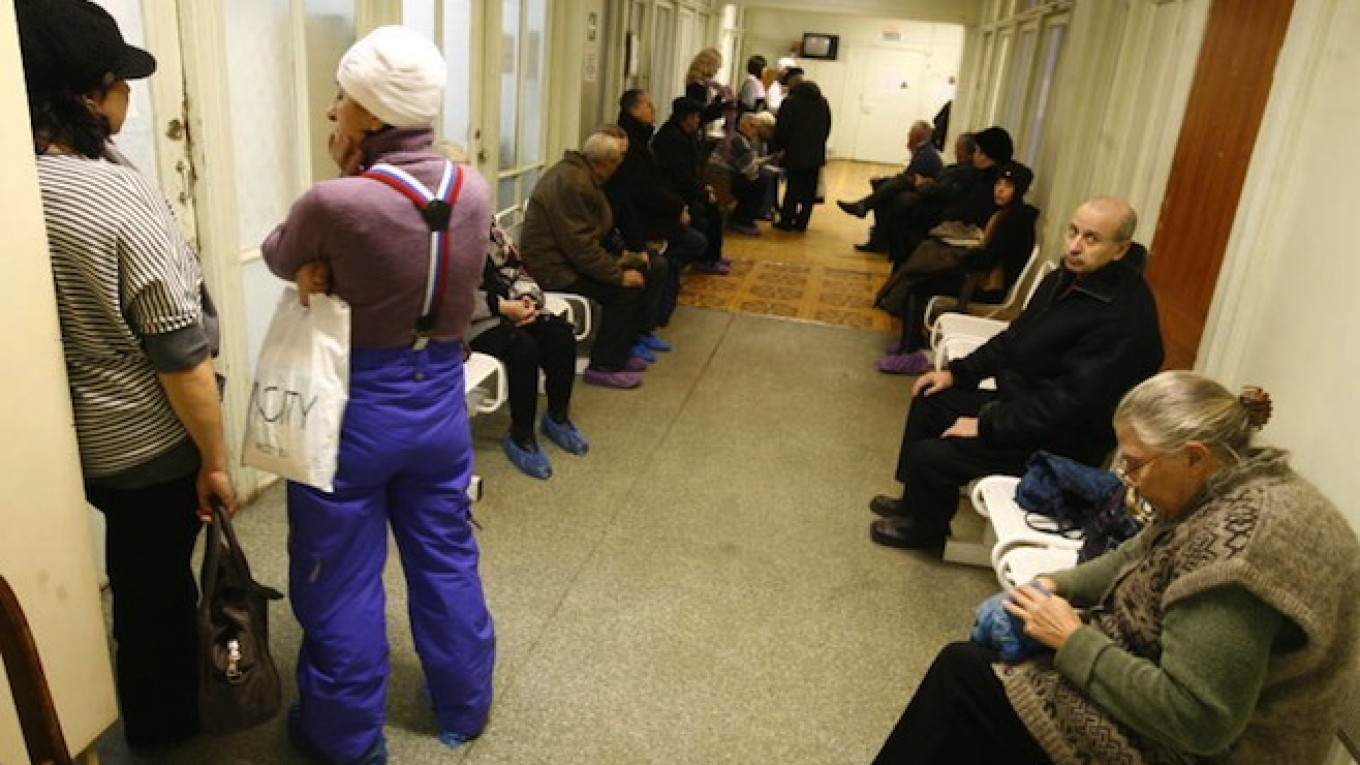Russia's attempts to reform its health services have resulted in a larger number of people in hospitals dying and an increased mortality rate in the country in general, a report by the government's accounting agency said.
The hospital mortality rate increased by 2.6 percent last year compared to the year before, as the number of patients who died increased by 18,000 over the period in which a reform of the healthcare system was being carried out, the Audit Chamber said in a report released Monday.
The country's overall mortality rate was 13.1 deaths per 1,000 people at the end of 2014, instead of the 12.8 rate that government estimates had predicted, the report said.
“The most important issue is that the optimization that has been carried out has failed to lead to the planned results of lowering mortality,” the report said.
Russia's death rate in the first two months of this year was also higher, exceeding the rate of the same period in 2014 by 2.2 percent, according to the report.
The much-debated “optimization” of healthcare services, which began in 2013, has seen a number of clinics shut and healthcare workers laid off. The moves have prompted protests by doctors, nurses and paramedics.
About 90,000 health workers have lost their jobs in Russia over the past year, even though those who kept their jobs have seen their salaries increase, according to the Audit Chamber report. Benefits to patients, however, remain in doubt.
“Despite the fact that an 'optimization' implies actions that lead to the best state of the system as a whole, the combination of measures that have been adopted is mostly limited to reducing the number of facilities, to their reorganization and to employee layoffs, which as a result has lead to a decline in the availability of services,” the Audit Chamber said in its report.
The report presents “very sad numbers and disturbing data,” editor-in-chief of Nezavisimaya Gazeta daily Konstantin Remchukov said in a talk-show program on Ekho Moskvy radio on Monday night.
But, Remchukov added, the revamping of health services has led to some substantial improvements — if only in the Russian capital.
Twenty-three specialized cardiac centers have opened in Moscow, with emergency services operating around the clock to receive city inhabitants who call an ambulance for a suspected heart attack, Remchukov said. All suspected heart attack cases are now take to the specialized centers.
“Over the year, mortality for such calls with heart attacks that are transported by ambulances has declined three-fold in Moscow,” he said. “It used to be 27 [cases per 1,000], now it's 8.5, and this is already a result on the level of the Czech Republic.”
The average Muscovite also lives six years longer than the national average — 76.7 years compared to 70.8 years — according to figures cited earlier this month by the city's health department head Alexei Khripun.
But beyond the capital, hospital mortality rates have increased in 61 of Russia's regions – including 49 regions where overall numbers of patients in hospitals have declined, according to the Audit Chamber report.
The number of people who died at home has also increased in a number of regions, including those that saw more patients dying in hospitals as well, the report said.
A Message from The Moscow Times:
Dear readers,
We are facing unprecedented challenges. Russia's Prosecutor General's Office has designated The Moscow Times as an "undesirable" organization, criminalizing our work and putting our staff at risk of prosecution. This follows our earlier unjust labeling as a "foreign agent."
These actions are direct attempts to silence independent journalism in Russia. The authorities claim our work "discredits the decisions of the Russian leadership." We see things differently: we strive to provide accurate, unbiased reporting on Russia.
We, the journalists of The Moscow Times, refuse to be silenced. But to continue our work, we need your help.
Your support, no matter how small, makes a world of difference. If you can, please support us monthly starting from just $2. It's quick to set up, and every contribution makes a significant impact.
By supporting The Moscow Times, you're defending open, independent journalism in the face of repression. Thank you for standing with us.
Remind me later.


